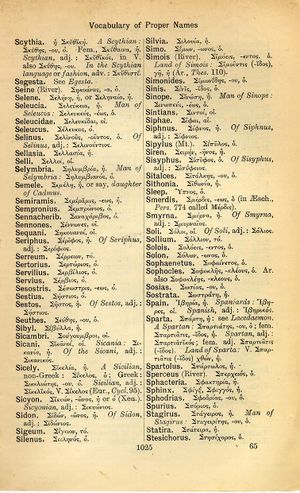Sparta
Νόσον δὲ κρεῖττόν ἐστιν ἢ λύπην φέρειν → Morbum quam tristitatem exantles facilius → Es lässt sich leichter krank sein als betrübt
English > Greek (Woodhouse)
Σπάρτη, ἡ: see Lacedaemon.
A Spartan: Σπαρτιάτης, -ου, ὁ; fem. Σπαρτιᾶτις, -ιδος, ἡ.
Spartan, adj.: Σπαρτιατικός; fem. adj. Σπαρτιᾶτις (-ιδος).
Land of Sparta: V. Σπαρτιᾶτις (-ιδος) χθών, ἡ.
Latin > English (Lewis & Short)
Sparta: ae (Gr. acc. Sparten, Ov. M. 10, 170), f., = Σπάρτη>.
I The famous capital of Laconia, more usually called Lacedaemon, near the mod. Mistra, Plin. 4, 5, 8, § 16; Plaut. Poen. 3, 3, 50; 3, 3, 53; Cic. Rep. 2, 23, 43; 2, 33, 58; id. tusc. 2, 14, 34; id. Off. 2, 22, 77; Verg. A. 2, 577 al.—Poet. collat. form Spartē, ēs, f., Prop. 3, 14 (4, 13), 1; Ov. M. 6, 414; 10, 170; 10, 217 al.— In Greek form, Cicero, in allusion to Euripides, has the word twice proverbially: Σπάρταν ἔλαχες, ταύταν κόσμει, i. e. Sparta is your country, make the most of it, Cic. Att. 4, 6, 2; cf. id. ib. 1, 20, 3.—Hence,
A Spartānus, a, um, adj., Spartan (mostly poet. for the class. Lacedaemonius): Hermione, Prop. 1, 4, 6: virgo, Verg. A. 1, 316: gens, Ov. M. 3, 208: lex, Prop. 3, 14 (4, 13), 21: disciplina, Liv. 38, 17: canes, Luc. 4, 441: discus, Mart. 14, 164: saxum, marble, id. 1, 56, 5; Curt. 10, 10, 14; Petr. 105; Val. Max. 2, 6, 1; 4, 6, ext. 3; Sen. Suas. 2, 16.— Subst.: Spartānus, i, m., a Spartan (mostly poet. and post-Aug.), Plaut. Poen. 3, 5, 25; Val. Max. 3, 2, ext. 3 al.—Plur., Nep. Pelop. 2, 4; Tac. A. 2, 60; 3, 26; Curt. 7, 19, 39; Just. 2, 11; Claud. Cons. Mall. Theod. 153.—*
B Spartĭātĭcus, a, um, adj., Spartan: res, Plaut. Poen. 3, 4, 9. —*
C Spartĭăcus, a, um, adj., Spartan: Taenaros, App. M. 1, p. 102, 25.—*
D Spartĭcus, a, um, adj., Spartan: myrtus, Verg. Cul. 398 Sill. N. cr.—
E Spar-tĭātes, ae, m., a Spartan, Plaut. Poen. 3, 5, 35; Cic. Tusc. 1, 43, 102; 2, 15, 36; 2, 16, 37; 5, 27, 77; id. Div. 1, 34, 76.—
II Transf., Greece, Naev. B. Pun. 1, 9.

